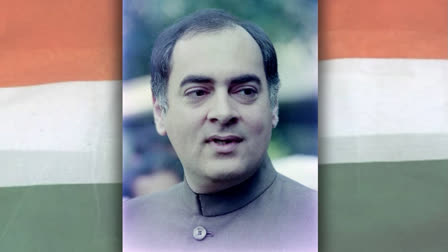Hyderabad:Sadbhavana Diwas, commonly known as Harmony Day, is an annual celebration commemorated on August 20th. The 80th birth anniversary of former Prime Minister Rajiv Gandhifalls on August 20, 2024. Former Prime Minister Rajiv Gandhi, a visionary leader who strove for national integration, peace, and public harmony among India's diverse population, was born on August 20, 1944.
Why We Celebrated Sadbhavana Diwas?:
In English, the term 'Sadbhavana' means 'goodwill and bonafide". Rajiv Gandhi, being the youngest Prime Minister, had a unique and innovative thought process. He had a vision of a developed nation through several national and international programs that he led. The primary goal of Sadbhavana Diwas is to foster national cohesion and communal harmony among people of different faiths and languages. The Day strives to promote national unity by fostering long-term peace and communal harmony among people of all castes, sects, and faiths in India.
About Rajiv Gandhi: an Idealistic Leader
In 1984, following his mother Indira Gandhi's assassination, Rajiv Gandhi became India's youngest Prime Minister. He was born on August 20, 1944, and was the eldest son of Feroz Gandhi and Indira Gandhi. He attended Trinity College, Cambridge, to pursue an Engineering degree, but was unable to complete it.
Then he visited Imperial College London. He entered politics in 1980, following the murder of his brother, Sanjay Gandhi. He was only 40 years old when he assumed the post of Prime Minister of India. He served in government from 1984 to 1989 and contributed significantly to the country's progress. He implemented several innovations aimed at upgrading India's education and economy. Some of his significant achievements include:
National Policy on Education: Rajiv Gandhi established the National Policy on Education in 1986 to improve higher education plans and foster intellectual growth.
Jawahar Navodaya Vidhyalaya System: In 1986, Rajiv Gandhi established the Jawahar Navodaya Vidhyalaya System, a central-government-run institution that provides free residential education to rural children from sixth to twelfth grade.
Telecommunications Development: As a result of his efforts, MTNL (Mahanagar Telephone Nigam Limited) was founded in 1986, and public call offices (PCOs) were built to extend telephones throughout rural areas.
Economic reforms: After 1990, he implemented measures to reduce the License Raj, allowing firms and individuals to purchase capital, consumer products, and import bureaucratic restrictions.
Youth Empowerment: Rajiv Gandhi raised the voting age to 18 to encourage youth participation in the election process. He highlighted the potential of the country's young and implemented schemes such as the Jawahar Rozgar Yojana to create employment opportunities.
Sadbhavana Diwas’ Pledge:
On this day, citizens around the country take the following pledge: "I take this solemn pledge that I will work for the emotional oneness and harmony of all the people of India regardless of caste, religion, region or language. I further pledge that I shall resolve all differences among us through dialogue and constitutional means without resorting or violence."
Rajiv Gandhi National 'Sadbhavana' Award:
The Rajiv Gandhi National Sadbhavana Award was founded in 1992 by the All-Indian Parliamentary Commission of the Indian National Congress to honour former Prime Minister Rajiv Gandhi. This award is given out annually to those who have dedicated their lives to understanding and fostering the spirit of peace. The winners receive a cash prize of Rs.10 lakh as well as a prize. Some of the awardees are Lata Mangeshkar, Shubha Mudgal, Sunil Dutt, Amjad Ali Khan, Mohammad Azharuddin, Gopalakrishna Gandhi, and others.
Some lesser-known facts about Rajiv Gandhi:
- Rajiv Gandhi joined Air India in 1970 after training as a pilot at the Flying Club in Delhi
- Rajiv Gandhi enjoyed driving vehicles and was possibly the only politician in the country who drove himself during election campaigns or other visits
- Following Sanjay Gandhi's tragic death, Shankaracharya Swami Shri Swaroopanand urged that Rajiv Gandhi enter politics
- Rajiv Gandhi had a passion for photography. After his death, Sonia Gandhi, his wife and Congress interim president, published the book Rajiv's World: Photographs by Rajiv Gandhi in 1995
- Rajiv Gandhi was an honest and influential figure. He led the country toward modernity, developed schools, and supported young people. He intended to retain national unity, and his principal goal was to build a twenty-first-century India. His anti-corruption and nepotistic stance earned him his nickname "Mr Clean". He was assassinated on 21 May 1991 by the Liberation Tigers of Tamil Eelam (LTTE) cadres in a suicide bombing attack.
